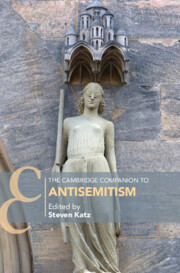Book contents
- The Cambridge Companion to Antisemitism
- Cambridge Companions to Religion
- The Cambridge Companion to Antisemitism
- Copyright page
- Contents
- Contributors
- Acknowledgments
- Introduction
- Part I The Classical Period
- Part II Medieval Times
- Part III The Modern Era
- 15 Martin Luther and the Reformation
- 16 The Enlightenment and Its Negative Consequences
- 17 Modern Antisemitism in Western Europe
- 18 Antisemitism in Late Imperial Russia and Eastern Europe through 1920
- 19 Marxism, Socialism, and Antisemitism
- 20A Antisemitism in Modern Literature and Theater
- 20B Antisemitism in Modern Literature and Theater
- 20C Antisemitism in Modern Literature and Theater
- 21 Antisemitism in America, 1654–2020
- 22 Antisemitism in the Weimar Republic and the Third Reich
- 23 New Islamic Antisemitism, Mid-19th to the 21st Century
- 24 Anti-Zionism as Antisemitism
- 25 New Issues
- 26 Antisemitism in Social Media and on the Web
- 27 Theories on the Causes of Antisemitism
- Appendix The International Holocaust Remembrance Alliance: Working Definition of Antisemitism
- Index
- Cambridge Companions to Religion
- References
23 - New Islamic Antisemitism, Mid-19th to the 21st Century
from Part III - The Modern Era
Published online by Cambridge University Press: 05 May 2022
- The Cambridge Companion to Antisemitism
- Cambridge Companions to Religion
- The Cambridge Companion to Antisemitism
- Copyright page
- Contents
- Contributors
- Acknowledgments
- Introduction
- Part I The Classical Period
- Part II Medieval Times
- Part III The Modern Era
- 15 Martin Luther and the Reformation
- 16 The Enlightenment and Its Negative Consequences
- 17 Modern Antisemitism in Western Europe
- 18 Antisemitism in Late Imperial Russia and Eastern Europe through 1920
- 19 Marxism, Socialism, and Antisemitism
- 20A Antisemitism in Modern Literature and Theater
- 20B Antisemitism in Modern Literature and Theater
- 20C Antisemitism in Modern Literature and Theater
- 21 Antisemitism in America, 1654–2020
- 22 Antisemitism in the Weimar Republic and the Third Reich
- 23 New Islamic Antisemitism, Mid-19th to the 21st Century
- 24 Anti-Zionism as Antisemitism
- 25 New Issues
- 26 Antisemitism in Social Media and on the Web
- 27 Theories on the Causes of Antisemitism
- Appendix The International Holocaust Remembrance Alliance: Working Definition of Antisemitism
- Index
- Cambridge Companions to Religion
- References
Summary
Drawing on classical antisemitic themes, this chapter reconstructs the growth of antisemitism in the modern Muslim world.
Information
- Type
- Chapter
- Information
- The Cambridge Companion to Antisemitism , pp. 430 - 447Publisher: Cambridge University PressPrint publication year: 2022
References
Further Reading
Accessibility standard: Unknown
Why this information is here
This section outlines the accessibility features of this content - including support for screen readers, full keyboard navigation and high-contrast display options. This may not be relevant for you.Accessibility Information
- 1
- Cited by
